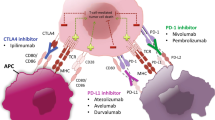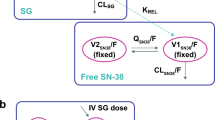Abstract
Purpose: BMS-214662 is a novel farnesyltransferase (FT) inhibitor that has shown promising suggestions of single agent activity in patients with advanced solid tumors when administered as a 1 h intravenous (i.v.) infusion every 3 weeks. The degree of FT inhibition in peripheral blood mononuclear cells (PBMCs) was greatest at the end of the infusion and rapidly reversed as the concentration of the drug in the plasma decayed. A second phase I trial of BMS-214662 administered as a weekly 24 h i.v. infusion was initiated to determine if the duration of maximum FT inhibition could be significantly extended by prolonging the infusion time and increasing the frequency of administration. Patients and methods: Infusion of BMS-214662 was prolonged from 2, 4, 8, 16, 24 h in single patient cohorts and repeated weekly for 3 out of 4 weeks. The initial dose was 56 mg/m2. When the infusion duration reached 24 h, the dose was escalated at a constant multiples of 1.4 in single patient cohorts until the occurrence of toxicity greater than grade 1, upon which groups of at least three patients were evaluated at each dose level. The plasma pharmacokinetics and FT inhibition in PBMCs were measured in all patients at the prospective maximum tolerated dose. Results: Nineteen patients participated in the study (11 males/8 females) and the weekly dose was increased to a maximum of 300 mg/m2 given as a 24 h i.v. infusion. Drug-related toxicity greater than grade 1 first occurred at 300 mg/m2, with two patients experiencing dose-limiting toxicity. One patient developed a grade 3 hyponatremia and another developed reversible grade 3 diarrhea, grade 2 renal toxicity, and grade 3 transaminitis. A 275 mg/m2 dose was then evaluated, where one of the three patients treated experienced reversible grade 4 renal toxicity and grade 3 diarrhea. In view of the identical renal toxicity at 275 mg/m2 in another study and limited drug availability, there was no further accrual to this dose level and the study was closed. No evidence of antitumor activity was observed. The plasma pharmacokinetics of BMS-214662 was linear with high interpatient variability. In the three patients evaluated at the 275 mg/m2 dose level, the maximum inhibition of FT activity in PBMCs was 47±23% of the baseline. Conclusion: Administering BMS-214662 as a weekly 24 h continuous i.v. infusion permitted a considerably greater dose intensity to be delivered as compared to a single 1 h infusion given once every 3 weeks. The more prolonged infusion schedule resulted in a much lower degree of maximum FT inhibition in PBMCs than achieved with the 1 h infusion, although the duration of enzyme inhibition was longer, consistent with the lower peak plasma concentration of the drug provided by comparably tolerated doses when given as a 24 h infusion. Similarly, delivering the drug with increased dose intensity permitted by this weekly administration schedule did not appear to enhance its therapeutic benefit, at least in this phase I trial. Continued development of BMS-214662 may depend upon the potential for using it in combination with other anticancer drugs.


Similar content being viewed by others
References
Midgley RS, Kerr DJ (2002) RAS as a target in cancer therapy. Crit Rev Oncol Hematol 44:109–120
Adjei AA (2001) Blocking oncogenic RAS signaling in cancer therapy. J Natl Cancer Inst 93:1062–1074
Cohen LH, Pieterman E, van Leeuwen RE et al (2000) Inhibitors of prenylation of RAS and other G-proteins and their applications as therapeutics. Biochem Pharmacol 60:1061–1068
Rose WC, Lee FY, Fairchild CR et al (2001) Preclinical antitumor activity of BMS-214662, a highly apoptotic and novel farnesyltransferase inhibitor. Cancer Res 61:7507–7517
Ryan DP, Eder JP Jr, Puchalski T et al (2004) Phase I clinical trial of the farnesyltransferase inhibitor BMS-214662 given as a 1-hour intravenous infusion in patients with advanced solid tumors. Clin Cancer Res 10:2222–2230
Simon R, Freidlin B, Rubinstein L et al (1997) Accelerated titration designs for phase I clinical trials in oncology. J Natl Cancer Inst 89:1138–1147
Gabrielsson J, Weiner D (1994) Pharmacokinetic/pharmacodynamic data analysis: concepts and applications. Swedish Pharmaceutical Press, Stockholm
Mizuta E, Tsubotani A (1985) Preparation of mean drug concentration-time curves in plasma. A study on the frequency distribution of pharmacokinetic parameters. Chem Pharm Bull 33:1620–1632
Lacey LF, Keene ON, Pritchard JF et al (1997) Common noncompartmental pharmacokinetic variables: are they normally or log-normally distributed? J Biopharm Stat 7:171–178
Miller RG (1974) The jackknife—a review. Biometrika 61:1–15
Hahn WC, Counter CM, Lundberg AS et al (2000) Creation of human tumor cells with defined genetic elements. Nature 400:464–468
Chin L, Tam A, Pomerantz J et al (2000) Essential role for oncogenic RAS in tumour maintenance. Nature 400:468–472
Sebti SM, Adjei AA (2004) Farnesyl transferase inhibitors. Sem Oncol 31(Suppl 1):28–39
Hunt JT, Ding CZ, Batorsky R et al (2000) Discovery of (R)-7-cyano-2,3,4,5-tetrahydro-1-(1H-imidazol-4-ylmethyl)-3-(phenylmethyl)-4-(2-thienysulfonyl)-1H-1,4-benzodiazepine (BMS-214662), a farnesyltransferase inhibitor with potent preclinical antitumor activity. J Med Chem 43:3587–3595
Sebti SM, Der CJ (2003) Searching for the elusive targets of farnesyltransferase inhibitors. Nat Rev Cancer 3:945–951
Cortes J, Faderl S, Estey E, Kurzrock R, Thomas D, Beran M, Garcia-Manero G, Ferrajoli A, Giles F, Koller C, O’Brien S, Wright J, Bai SA, Kantarjian H (2005) Phase I study of BMS-214662, a farnesyl transferase inhibitor in patients with acute leukemias and high-risk myelodysplastic syndromes. J Clin Oncol 23(12):2805–2812
Acknowledgements
This study was supported in part by the grant U01-CA-62490 and the DF/HCC core grant P30-CA-0516 from the National Cancer Institute (Bethesda, MD, USA).
Author information
Authors and Affiliations
Corresponding author
Additional information
Preliminary results were presented at the 38th annual meeting of the American Society for Clinical Oncology, May, 2002, Orlando, FL, USA.
Rights and permissions
About this article
Cite this article
Eder, J.P., Ryan, D.P., Appleman, L. et al. Phase I clinical trial of the farnesyltransferase inhibitor BMS-214662 administered as a weekly 24 h continuous intravenous infusion in patients with advanced solid tumors. Cancer Chemother Pharmacol 58, 107–116 (2006). https://doi.org/10.1007/s00280-005-0134-0
Received:
Accepted:
Published:
Issue Date:
DOI: https://doi.org/10.1007/s00280-005-0134-0




